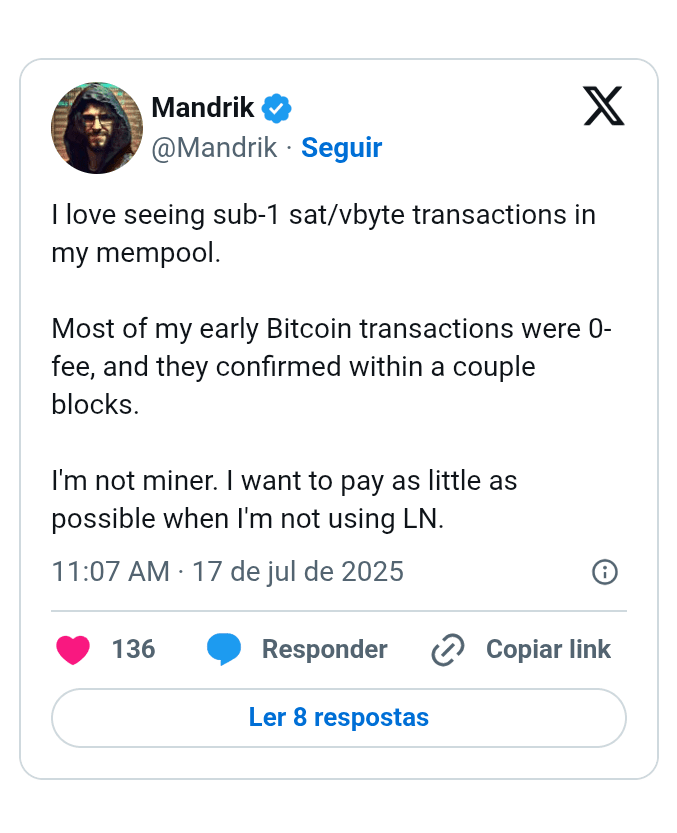Users of the Bitcoin network can pay as little as 0.1 satoshi per virtual byte (sat/vByte) for their transactions to be processed.
The debate over whether Bitcoin is better suited as a means of payment or as a store of value has reignited. This time, the discussion gained momentum after a sharp reduction in the cost to send the leading cryptocurrency on the market.
The main Bitcoin blockchain explorer, the Mempool, announced this week that now users of the largest cryptocurrency network can pay as little as 0.1 satoshi per virtual byte (sat/vByte) for their transactions to be processed. A satoshi is the smallest unit of a Bitcoin, equivalent to 0.00000001 BTC.
Previously, the minimum cost was 1 satoshi/vByte for miners to process a transaction. However, due to low activity on the Bitcoin network, miners have reduced this minimum fee by 90% to include more blocks in the blockchain.
These measures refer to the weight of a transaction and the speed at which it will be processed. When the blockchain is congested, the cost to prioritize transactions increases.
The fact that the cost has been reduced so drastically indicates that the demand for space in blocks has fallen. In other words, fewer people are making transactions — which has led to the acceptance of much lower fees.
The Bitcoin network is operated by miners, who today are mostly industrial operations consisting of warehouses full of expensive computers that process transactions.
Miners are rewarded for processing blocks — which contain transaction data — and adding them to the blockchain. For each block processed, miners receive 3.125 BTC (equivalent to $367,000 at current prices), in addition to transaction fees.
But as fewer people use the Bitcoin network to send funds, inscribe Ordinals (also known as NFTs), or perform other actions, transaction fees remain low — which means that miners earn less for each validated block.
As explained to Decrypt by the pseudonymous miner Econoalchemist, transactions with a fee of 0.1 sat/vByte have always been allowed by the protocol, but some node operators may choose to ignore such low fees. The actions of the Mempool and others this week suggest a growing movement of consensus to accept these transactions with reduced fees.
"Over time, political rules will tend to align with consensus rules, eliminating most relay restrictions," he said.
Big names in the crypto and payments sector have previously lamented the lack of activity on the blockchain — among them, Twitter founder and Square CEO Jack Dorsey. A staunch advocate of Bitcoin, he has stated that the cryptocurrency will only succeed if it is used for what it was created for: to send and receive money.
"I think that if it doesn’t transition to payments and find everyday use, it will become increasingly irrelevant," Dorsey said about Bitcoin in a podcast in April.
Despite this, as Bitcoin reaches new all-time highs, it seems to be thriving — although for another purpose: it is being used as an investment in a store of value.
"I think time will tell, but Bitcoin seems to be consolidating as [a store of value] and not being used for any type of transaction," said Scott Norris, CEO of the Bitcoin mining company Optiminer, to Decrypt.
He added: "As long as there is upward momentum in the price, people will not use Bitcoin to transact. Bitcoin is like digital land — it is very valuable and its value continues to grow. It is still very new, so it hasn't reached its peak. But it's not the best means for transactions. You want to leverage your Bitcoin, not spend it."
It is worth remembering that whoever sends a cryptocurrency transaction chooses the fee: if they are in a hurry for the payment to be seen and processed by miners, they can increase the fee and it will be included more quickly in a block.
Still, some users of Crypto Twitter (or X) celebrated the fact that it is cheaper to use the main blockchain. One of them, Mandrick, wrote: "I love seeing transactions below 1 sat/vByte in my Mempool," adding that he wanted to "pay as little as possible."

When asked by someone who claimed that "fees are necessary to protect the network," he replied, "It's like when rich liberals complain about not being taxed enough. Just send more money to the IRS — they accept it!"